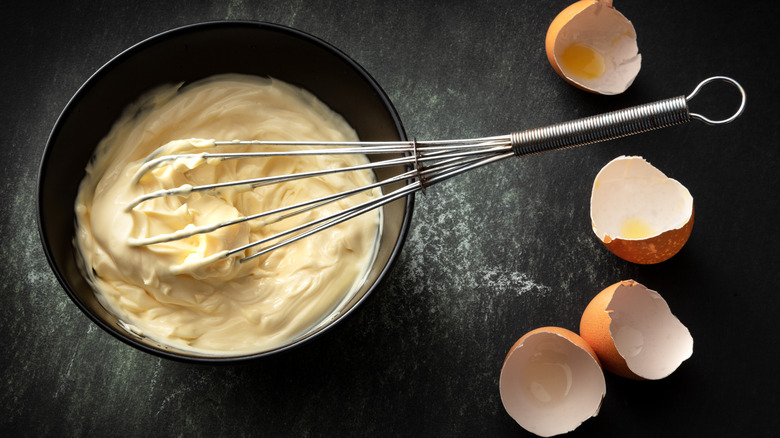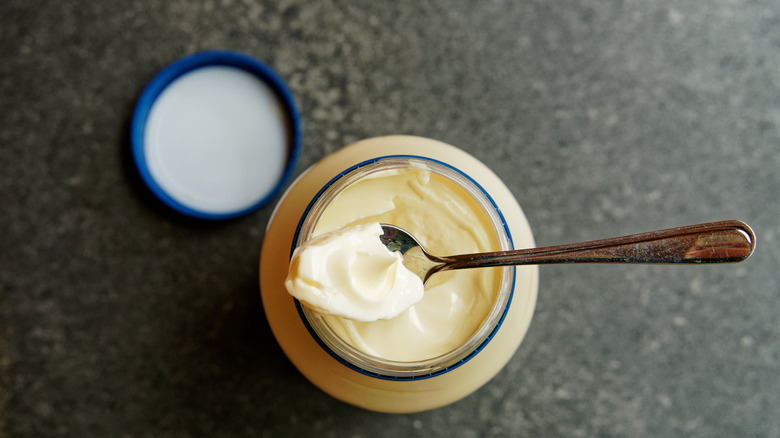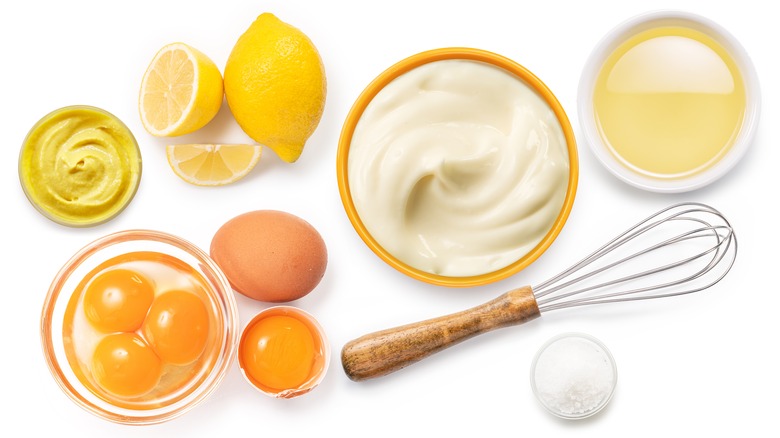Why Mayonnaise Tastes Better At Restaurants
If you're a fan of mayonnaise-based deli salads like tuna or chicken salad, you may have encountered the challenge of crafting the dish at home to have a similar taste and texture to restaurant quality. And if you've been wondering what kind of culinary trickery you need to pull off to master making such culinary-worthy salads and sauces in your own kitchen, you might be surprised by how simple the answer really is.
Much of it boils down to the fact that, when it comes to making dishes with mayonnaise, restaurants often give a hard pass to the typical mayo that home cooks might grab at the grocery store. Instead, they tend to use heavy-duty mayonnaise. Not only does the extra heavy mayo give dishes like potato, pasta, and egg salads a richer flavor, it can also improve their consistency.
Consider how your container of pre-made tuna salad looks a little watery when you whip it out at lunchtime — heavy-duty mayonnaise can help prevent that. Plus, it's also perfect for making sauces where you want to retain their thick texture, like remoulade or aioli.
What is heavy-duty mayonnaise?
Mayonnaise is a simple condiment made from only a few ingredients. While there can be variations and additions, at its most basic, mayo is a combination of oil, eggs, and an acidic component (often vinegar or lemon). There are a variety of oils that brands may use, from olive oil, avocado oil, or vegetable oil to soybean, safflower, or sunflower oil. And while some brands may use white distilled vinegar, others may include apple cider vinegar.
However, while both oil and acid play a part in the taste and texture, the ingredient that is the shining star in making heavy-duty mayonnaise superior is the egg. Eggs are responsible for binding all of the ingredients in mayonnaise together. The yolk of the egg contains lecithin, which is an emulsifier that works to keep the mixture stable. While most mayonnaise (with the exception of vegan mayo) contains eggs, heavy-duty mayo has additional yolks that lead it to stay thick and creamy, even when warmed. Plus, having more adds in that extra rich flavor, too.
Alternatives to heavy-duty mayonnaise
There are multiple brands that make extra heavy versions of mayonnaise, from Hellmans and Kraft to Duke's. However, they're often sold by restaurant suppliers in enormous quantities. Even if you can find one of those 30-pound pails of it, you'd likely have to make a lot of tuna sandwiches to use it up before its expiration date. Though there are some retailers who may carry it, there are some other solutions rather than going on a hunt.
First, since egg yolks are the key emulsifiers in mayonnaise, you can choose a brand that already incorporates more yolks. Regular Duke's mayonnaise has a cult following and is the mayo brand most beloved by even Alton Brown. It's known for its creaminess thanks to the use of more yolks than many other brands. Meanwhile, Kewpie, a wildly popular Japanese mayonnaise, is also beloved for its creamy texture, which it owes to the fact that the brand uses exclusively the yolk and no egg whites. While neither of these may exactly mimic the flavor of some restaurant mayonnaise, by using them you may be able to more closely replicate the consistency in your own deli-style salads or homemade sauces like aioli, dressing, or tartar sauce.
Another option is to make your own mayonnaise at home. Start with a standard homemade mayonnaise recipe and experiment with the quantity of egg yolks until you get that creamy texture that mixes perfectly into your favorite meat and seafood salads.



